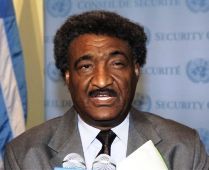Sudan’s envoy doesn’t back down on warning to UN
Oct 6, 2006 (UNITED NATIONS) — The United States and Sudan’s U.N. envoy were at odds on Friday over whether Khartoum retracted a warning to dozens of countries not to pledge troops to a U.N. force for Darfur.
 In an unsigned letter this week, Sudan’s U.N. mission warned that any nation volunteering troops for a U.N. peacekeeping force in its vast Darfur region was committing a “hostile act” that was a “prelude to an invasion.”
In an unsigned letter this week, Sudan’s U.N. mission warned that any nation volunteering troops for a U.N. peacekeeping force in its vast Darfur region was committing a “hostile act” that was a “prelude to an invasion.”
The U.N. Security Council has authorized a peacekeeping force of up to 22,500 troops and police for Darfur, but Sudan has refused to agree to the operation. U.N. officials have begun to recruit troops for that mission.
An underfinanced African Union force of 7,000 troops and monitors has been unable to stop the violence that has driven 2.5 million people from their homes and left at least 200,000 dead since 2003.
U.S. Ambassador John Bolton said that after he began a push for a U.N. Security Council statement to rebuke Sudan for the letter, Khartoum’s ambassador to Washington told the U.S. State Department the letter no longer reflected Khartoum’s policy.
“Our view, based on what the Sudanese told us in Washington, is that the policy has been reversed. We interpret it very simply — they popped off, we stood up and they backed down,” Bolton told reporters.
But in New York, Sudan’s U.N. ambassador, Abdalmahmood Abdalhaleem Mohamed, said his country stood by the letter’s principles.
“There is no hostility in the letter at all, the letter is a very clear reflection of our views,” Mohamed told reporters. “Our objective in sending this letter is dialogue, not confrontation.”
“We did not intimidate, we are a victim of intimidation. We cannot intimidate other states,” Mohamed said.
He added the letter was sent in response to queries the mission received from potential troop-contributing countries, which he said were unsure of whether to make a commitment.
Japan’s U.N. ambassador, Kenzo Oshima, the Security Council president, said he had met Mohamed and intended to hold further talks on how best to allay the concerns of nations he said felt the letter was “inappropriate” and “offensive.”
FOCUS ON DARFUR
Bolton said he deferred talks on a draft statement that would have strongly criticized Sudan for the letter.
U.N. Secretary-General Kofi Annan said on Thursday in his monthly report on Darfur that the region was “on the brink of a catastrophic situation” and that a desperately needed humanitarian operation may have to be drastically cut.
The world body is trying to reinforce the African Union troops by sending 100 personnel to run communications and other equipment as a prelude to a U.N. operation, which Sudanese President Omar Hassan al-Bashir has accepted.
Some diplomats as well as Jan Pronk, the top U.N. envoy in Sudan, have suggested countries should push for a prolonged and beefed-up African Union force.
So far, the Security Council and top U.N. officials have rejected that plan and say helping the AU is a transition to a U.N. force.
In Geneva, the U.N. refugee agency said on Friday that violence in Darfur in across the border in eastern Chad had compromised its ability to work in the region.
The United Nations runs 12 camps in eastern Chad for 213,000 Darfur refugees and to help thousands of Chadians escaping fighting between President Idriss Deby’s troops and rebels trying to end his rule.
The Security Council, in a resolution, extended for six months a U.N. mission in the south of Sudan where 10,000 peacekeepers monitor a peace pact that ended a 21-year civil war in that region..
(Reuters)
